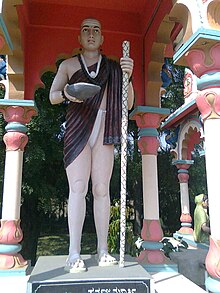Sarvajña | |
|---|---|
 Statue At Kudalasangama | |
| Born | Early 16th century Abalur, Hirekerur Taluk, Haveri District |
| Died | Masur, Rattihalli Taluk, Haveri District |
| Occupation | Poet, Pragmatist, Philosopher, Monk |
Sarvajña was a Kannada poet, pragmatist and philosopher of the 16th century. The word "Sarvajna" in Sanskrit literally means "the all knowing". His father was Kumbara Malla and his mother was Mallaladevi. His birth anniversary is celebrated on February 20 every year. He belongs to the caste of Kumbara. He is famous for his pithy three-lined poems called tripadi (written in the native three-line verse metre, "with three padas, a form of Vachana"). He is also referred as Sarvagna in modern translation.[1]
Early life[edit]
The period of Sarvajña's life[2] has not been determined accurately, and very little is known about his personal life.
See also[edit]
References[edit]
- Sources
- Medieval Indian Literature: An Anthology By K. Ayyappapanicker, Sahitya Akademi
- Gandham Appa Rao, Vemana and Sarvajña, Progressive Literature (1982).
- Anthology of Sarvajna's sayings, Kannada Sahitya Parishat (1978).
- K. B Prabhu Prasad, Sarvajna, Sahitya Akademi (1987), reprint 1994 ISBN 81-7201-404-X.
- Notes
- ^ "ಕವಿ ಸರ್ವಜ್ಞ (Poet Sarvajna)". kanaja.in , Kanaja. Retrieved 28 September 2017.
- ^ "Sarvagna and his vachanna". web.missouri. Retrieved 22 October 2010.
External links[edit]
- know more about sarvajna and his poems
- Sarvajna's three-liners (Kannada page)
- Sarvajna's three-liners (with English translations)
- Picture of Sarvjna's Manuscript
- Sarvajna's vachana in Kannada
- Sarvagna's Tripadi with translation, transliteration and explanation
- 200+ Collection of Sarvajna Vachanagalu(Android App)
- An app with Sarvagna Tripadis curated for application in today's world
Well, that’s interesting to know that Psilotum nudum are known as whisk ferns. Psilotum nudum is the commoner species of the two. While the P. flaccidum is a rare species and is found in the tropical islands. Both the species are usually epiphytic in habit and grow upon tree ferns. These species may also be terrestrial and grow in humus or in the crevices of the rocks.
View the detailed Guide of Psilotum nudum: Detailed Study Of Psilotum Nudum (Whisk Fern), Classification, Anatomy, Reproduction